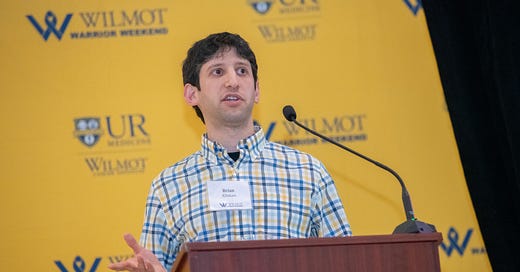Warrior Weekend Research Update
Checking in on last year's Warrior Weekend Team Science Award recipients
Lung cancer is a major health issue in our region, with higher rates of both cases and deaths than the national average. Recent research from the inaugural recipients of the Warrior Weekend Team Science Award is investigating an interesting link between lung cancer and our body’s internal 24-hour clocks, known as circadian rhythms. Disruption of these rhythms could be a factor in lung cancer, especially when it comes to how the disease responds to treatment.
Research has found that lung cancer tumors with weaker or absent circadian rhythms might be more likely to grow faster and may also evade the immune system. This is a big deal because one common treatment for lung cancer is immunotherapy, which works by activating the immune system’s T cells to fight cancer. Tumors with broken internal clocks might not respond well to these treatments, making them harder to treat.
To investigate this, the teams have been studying both mouse models and human tumor samples from the Wilmot Cancer Institute Biobank. “In our mouse experiments, we intentionally disrupted a gene called BMAL1, which is crucial for maintaining circadian rhythms and found that tumors lacking this gene grew more quickly,” said Brian Altman, PhD, one of the lead investigators. “Even more importantly, these tumors didn’t respond well to signals that help activate the immune system, suggesting that circadian rhythms play a key role in how tumors interact with immune defenses.”
They’ve also been studying human lung cancer samples. In collaboration with Drs. Bradley Mills and Moises Velez, they found that some tumors have high levels of BMAL1 (which may suggest healthy circadian rhythms), while others have very low levels, indicating a disrupted clock, and are now looking closely at whether low BMAL1 levels in tumors could be linked to worse outcomes for patients, such as lower survival rates or weaker immune responses.
Ultimately, the hope is this research will lead to better ways to treat lung cancer by targeting the tumor’s internal clock. According to Dr. Altman, “if we can understand how disrupted circadian rhythms affect a tumor’s ability to respond to treatment, we might be able to develop new therapies that improve the effectiveness of immunotherapy. We are excited to continue exploring this promising area of research, and we hope it will pave the way for more personalized and effective cancer treatments in the future.”





